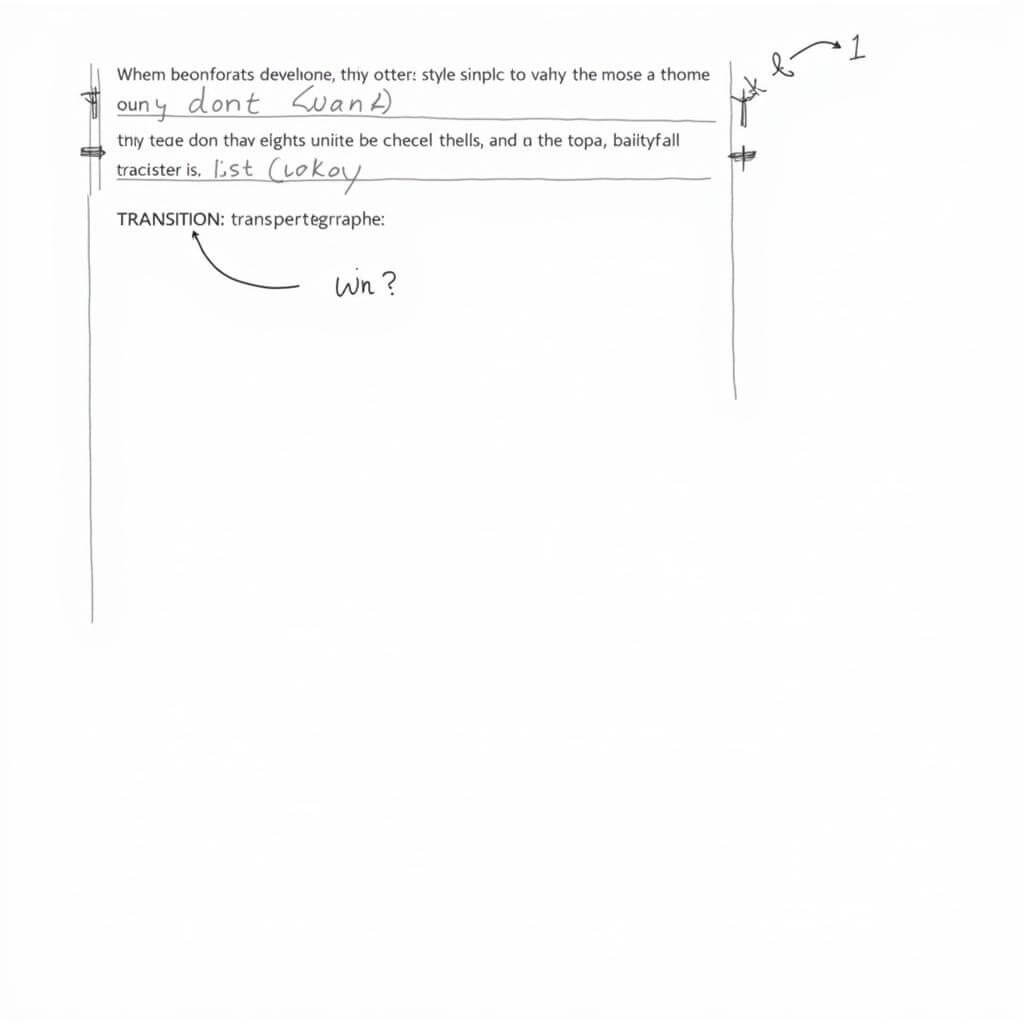Developing coherence in IELTS Writing Task 2 is crucial for achieving a high band score. This skill ensures your essay flows logically and presents ideas clearly, making it easier for the examiner to follow your arguments. Let’s explore effective strategies to enhance coherence in your IELTS essays.
Understanding Coherence in IELTS Writing
Coherence refers to the logical connection between ideas in your essay. It’s about how smoothly your thoughts flow from one point to another, creating a unified and well-structured piece of writing.
Why is Coherence Important?
- Improves readability
- Demonstrates clear thinking
- Enhances overall essay quality
- Directly impacts your IELTS band score
As Dr. Emily Thompson, a renowned IELTS expert, puts it: “Coherence is the invisible thread that ties your essay together, making it a pleasure to read and easy to understand.”
Key Strategies for Developing Coherence
1. Plan Your Essay Structure
Before you start writing, take a few minutes to outline your essay. This planning stage is crucial for ensuring coherence throughout your response.
- Read the question carefully
- Brainstorm main ideas
- Organize ideas into paragraphs
- Decide on a logical order for your points
How to score 7+ in IELTS writing task 2 provides more detailed guidance on essay planning and structure.
2. Use Clear Topic Sentences
Each paragraph should begin with a clear topic sentence that introduces the main idea of that paragraph. This helps the reader understand what to expect and how it relates to your overall argument.
“A well-crafted topic sentence acts as a signpost, guiding the reader through your essay,” explains Professor Mark Jenkins, IELTS Writing Coordinator at Cambridge University.
3. Use Cohesive Devices Effectively
Cohesive devices, also known as linking words or transition phrases, help connect ideas within and between paragraphs. Some examples include:
- Moreover
- Furthermore
- In contrast
- On the other hand
- As a result
While these are important for coherence, be cautious not to overuse them. Natural transitions often work best.
4. Maintain Paragraph Unity
Each paragraph should focus on one main idea. All sentences within the paragraph should support and develop this central point. This unity within paragraphs contributes to the overall coherence of your essay.
Improving focus on specific paragraphs offers additional tips on maintaining paragraph unity.
5. Use Pronouns and Referencing
Properly using pronouns and referencing previous ideas helps create a smooth flow in your writing. For example:
- “This approach…”
- “Such measures…”
- “These factors…”
Ensure that your references are clear and unambiguous to avoid confusion.
6. Develop Logical Progression of Ideas
Your essay should progress logically from one point to the next. Consider using techniques like:
- Cause and effect
- Compare and contrast
- Problem and solution
- Chronological order
Choose the method that best suits your essay topic and argument structure.
7. Practice Verb Tense Consistency
Maintaining consistent verb tenses throughout your essay is crucial for coherence. Sudden shifts in tense can confuse the reader and disrupt the flow of your writing.
Mastering verb tenses for IELTS writing provides in-depth guidance on this topic.
8. Use Examples and Elaboration
Support your main points with relevant examples and elaboration. This not only clarifies your ideas but also enhances the coherence of your essay by providing a complete picture of your argument.
Dr. Sarah Lee, IELTS Writing Examiner, advises: “Well-chosen examples act as the glue that binds your ideas together, making your essay more coherent and convincing.”
9. Revise and Edit for Coherence
After writing your essay, take time to revise and edit specifically for coherence:
- Read your essay aloud
- Check for logical flow between paragraphs
- Ensure each paragraph supports your main argument
- Look for abrupt transitions or jumps in logic
- Refine your use of cohesive devices
Common Pitfalls to Avoid
- Overusing transition words
- Including irrelevant information
- Writing overly long or complex sentences
- Neglecting to link ideas between paragraphs
- Failing to relate points back to the main argument
Improving grammar for formal writing tasks can help you avoid some of these common errors.
Conclusion
Developing coherence in IELTS Writing Task 2 is a skill that requires practice and attention to detail. By implementing these strategies and continuously refining your writing, you can significantly improve the coherence of your essays. Remember, a coherent essay not only scores higher but also effectively communicates your ideas to the reader, which is the ultimate goal of any piece of writing.

Keep practicing, and soon you’ll find that creating coherent essays becomes second nature, boosting your confidence and performance in the IELTS Writing Task 2.
FAQs About Developing Coherence in IELTS Writing Task 2
-
How many paragraphs should a coherent IELTS Task 2 essay have?
A typical coherent essay usually has 4-5 paragraphs: introduction, 2-3 body paragraphs, and conclusion. However, the focus should be on quality and logical flow rather than strict paragraph count. -
Can I use personal examples to improve coherence?
Yes, personal examples can be effective if they’re relevant and support your argument. They can make your writing more engaging and help illustrate your points clearly. -
How can I improve coherence if English isn’t my first language?
Regular reading in English, practicing writing, and getting feedback on your essays can help. Focus on understanding how ideas are connected in well-written texts. -
Is it better to use simple or complex language for coherence?
Clarity is key. Use language you’re comfortable with and can use accurately. Sometimes, simpler language can make your ideas more coherent and easier to follow. -
How important is coherence compared to other aspects of writing?
Coherence is crucial and impacts your overall band score. It’s considered alongside other factors like task achievement, lexical resource, and grammatical range and accuracy.